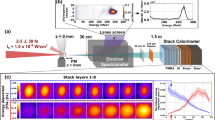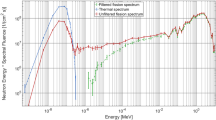Abstract
OUR knowledge of the γ rays of uranium has until now been confined to their discovery by Rutherford (Phys. Zeit., 1902, 517) and to the observations of Eve (ibid., 1907, 185). The latter directed attention to their extraordinary feebleness and to their relatively low penetrating power. Eve found that uranium gives out only about one-tenth as much γ radiation as thorium when examined through 0.64 cm. lead, which is most remarkable, considering that it gives about six times more β radiation. Whereas the γ rays of thorium have the same value for the absorption coefficient as those of radium [λ(cm.)-1=from 0.57 to 0.46 over a range of from 0.64 cm. to 3.0 cm. of lead], the uranium γ rays are far more easily absorbed. Eve gave the value 1.4 for λ for thicknesses of lead between 0.28 cm. and 0.92 cm. He stated that the radiation was homogeneous, that the absorption was exponential over this range, and that the rays were practically completely absorbed in 1 cm. of lead. He worked with uranyl nitrate.
This is a preview of subscription content, access via your institution
Access options
Subscribe to this journal
Receive 51 print issues and online access
$199.00 per year
only $3.90 per issue
Buy this article
- Purchase on Springer Link
- Instant access to full article PDF
Prices may be subject to local taxes which are calculated during checkout
Similar content being viewed by others
Author information
Authors and Affiliations
Rights and permissions
About this article
Cite this article
SODDY, F., RUSSELL, A. The γ Rays of Uranium. Nature 80, 7–8 (1909). https://doi.org/10.1038/080007b0
Issue Date:
DOI: https://doi.org/10.1038/080007b0
Comments
By submitting a comment you agree to abide by our Terms and Community Guidelines. If you find something abusive or that does not comply with our terms or guidelines please flag it as inappropriate.



